
Related
Guests
- Philippe SandsBritish attorney and professor at University College London. He is the author of the new book Torture Team: Rumsfeld’s Memo and the Betrayal of American Values. His last book was Lawless World: America and the Making and Breaking of Global Rules.
The House Judiciary Committee is preparing to hold a series of hearings examining the Bush administration’s role in authorizing the illegal torture of prisoners in US custody at Guantanamo and elsewhere. We speak to British attorney and author, Philippe Sands, author of the new book Torture Team: Rumsfeld’s Memo and the Betrayal of American Values. On Tuesday, Sands testified before the House Judiciary Sub-Committee on the Constitution, Civil Rights and Civil Liberties. [includes rush transcript]
Transcript
AMY GOODMAN: The House Judiciary Committee is preparing to hold a series of hearings examining the Bush administration’s role in authorizing the illegal torture of prisoners in US custody at Guantanamo and elsewhere. On Tuesday, Judiciary Committee Chair John Conyers subpoenaed Vice President Dick Cheney’s chief of staff, David Addington, to testify at a hearing scheduled for June 26th.
Three other former Bush administration officials have already agreed to testify: former Attorney General John Ashcroft, former Justice Department attorney John Yoo and former Pentagon official Douglas Feith. Over the past month, more evidence has emerged tying high-ranking Bush administration officials to the use of torture.
In April, ABC News reported Vice President Cheney, former National Security Adviser Condoleezza Rice, Defense Secretary Donald Rumsfeld and Secretary of State Colin Powell, CIA Director George Tenet and Attorney General John Ashcroft all discussed and approved how top al-Qaeda suspects would be interrogated by the CIA.
President Bush has also confirmed he was aware of these meetings. In an interview with ABC News, Bush said, “We started to connect the dots, in order to protect the American people. And yes, I’m aware our national security team met on this issue. And I approved.”
Today, we’re joined by British attorney and author, Philippe Sands. He is the author of the new book Torture Team: Rumsfeld’s Memo and the Betrayal of American Values. On Tuesday, Philippe Sands testified before the House Judiciary Sub-Committee on the Constitution, Civil Rights and Civil Liberties.
Welcome to Democracy Now!
PHILIPPE SANDS: It’s great to be back, Amy.
AMY GOODMAN: It’s good to have you with us. Talk about the Conyers subpoena of Vice President Dick Cheney’s chief of staff, David Addington.
PHILIPPE SANDS: Sure. Well, if you remember, we talked about a month ago, after a piece I had written for Vanity Fair came out. That piece, I’m told by Congressman Conyers, catalyzed his committee into focusing on the role of the lawyers, and they began the process of setting up hearings. Yesterday was the first hearing. They’ve issued letters of invitation to all of the lawyers that I’ve written about and several other individuals. All, I understand, have agreed to come voluntarily, with one exception, and that’s Mr. Addington, who was the Vice President’s lawyer at the time, now his chief of staff. He has indicated, however, in a letter of the 1st of May, that if subpoenaed, he would attend, and it is likely that he will now attend next month.
AMY GOODMAN: And what did you raise in your testimony before the congressional subcommittee?
PHILIPPE SANDS: Well, I think — I raised a number of issues, but the heart of this story is that the administration has spun a narrative that this was a bottom-up thing, they were simply reacting to requests from people on the ground. And what I’ve discovered, and what was the center of the gravity of what I said to the subcommittee, is that’s a false narrative. It came from the top down. A crime was committed in relation to the detainee that I’m looking at. The Geneva Conventions were violated. He was abused. He was probably, almost certainly, tortured in violation of international law. But the biggest story may well be the cover-up, the spin, that this came from the bottom up, when in fact it was top-down. And that seemed to have resonated with the committee.
AMY GOODMAN: Can you talk about this ABC News revelation about this Principals Committee, all the names that I just gave — you know, Condoleezza Rice, Rumsfeld, Colin Powell, George Tenet, Attorney General John Ashcroft — first time senior White House officials linked to an explicit group authorizing the CIA interrogation program, one top official recounting Ashcroft was the lone cabinet member to raise doubts? The official quoted Ashcroft as saying, “Why are we talking about this in the White House? History will not judge this kindly.”
PHILIPPE SANDS: I think it’s a very important revelation. Of course, it deals not with the military interrogations that I focused on, but with the CIA interrogations, but they went hand-in-hand, and it’s plain that they were all part and parcel of a decision taken at the top. It confirms my investigation, as a consequence; it’s namely that this came straight from the top.
The significance, of course, of this is that there seems to be a question as to whether the people immediately below the principals knew about this. I was in conversation, for example, a couple of days ago with Colin Powell’s former chief of staff, who expressed —-
AMY GOODMAN: Lawrence Wilkerson?
PHILIPPE SANDS: Larry Wilkerson, who -— I asked him, “Were you aware of this?” He said, “Absolutely not.” I asked him, “Did you have any inkling that this was going on? Do you think it could have happened?” And he expressed some considerable surprise. But if the President of the United States says a meeting happened, he knew about it, he approved it, it becomes, I think, a very, very big story, because you’ve got confirmation from the main man, so to speak.
AMY GOODMAN: Talk about the missing records of Mohammed al-Qahtani.
PHILIPPE SANDS: Well, I discovered in the course of meeting — I went around America, was treated with great hospitality and friendship. I spoke to everyone in the decision-making process, from the lawyers down at the bottom, Major General Dunlavey, who was the combatant commander at Guantanamo at the time, and his lawyer Diane Beaver, right up to Jim Haynes, who wrote the memorandum, the famous memorandum in which Mr. Rumsfeld scrolled, “Why is standing limited to four hours? I stand for eight to ten hours a day.”
AMY GOODMAN: Wait, explain that memo. It’s also the cover of your book.
PHILIPPE SANDS: It is the cover.
AMY GOODMAN: You’ve got the handwritten note of Donald Rumsfeld. First you see his signature, and then you see this note, “I stand for eight to ten hours a day. Why four hours?”
PHILIPPE SANDS: It’s become iconic. What Mr. Rumsfeld did was he authorized fifteen techniques of interrogation, but he wrote at the bottom of the document, “I stand for eight to ten hours a day. Why is standing limited to four hours?”
That’s been interpreted a number of ways. Was he signaling to the interrogators that the Secretary of Defense was willing for them to go further? Or was it just a jocular comment? I discussed that with a lot of people.
One of the people I met with on a couple of occasions, lengthy conversations, was Mike Dunlavey, the head of interrogations. And right at the end of one of the conversations, he mentioned to me that he had made efforts to go back to get hold of all the documentation to check the computers, to check the record of what had happened, and that there had been, he discovered, what he called a SNAFU, and everything had been lost.
And I think it will be for others now to follow up as to whether the interrogation materials relating to al-Qahtani have suffered the same fate as the interrogation materials of the CIA that, as we now know, were destroyed.
AMY GOODMAN: Can you talk about the former chair of the Joint Chiefs of Staff, General Richard Myers?
PHILIPPE SANDS: I had one lengthy and fascinating conversation with General Myers. I thought he was a decent man of integrity, but out of his depth. And on two issues, I was staggered, so staggered, in fact, that when I came home to London from my trip to the United States, I told my wife what I discovered in conversation with him, which I’m about to share with you, and she was disbelieving — she listened to the tapes — and said absolutely.
There were two points. Firstly, as everyone knows, the President took a decision that none of the detainees at Guantanamo would have any rights under the Geneva Conventions. It seems that General Myers was unaware of that. He was under the impression they had decided that Geneva would apply. So that was a fairly staggering discovery. But it was as nothing compared to the discovery, as we went through the techniques of interrogation one by one, that he had thought that these came out of the US Field Manual guide for interrogations. They were all prohibited. And as we went down the list, his jaw literally dropped. So I got the sense that the most powerful military man in the United States, indeed probably in the world, was blissfully unaware of what had been decided.
AMY GOODMAN: We’re talking to Philippe Sands. His book is Torture Team — it is just out this week — Rumsfeld’s Memo and the Betrayal of American Values.
I want to ask you about Supreme Court Justice Antonin Scalia’s recent statement that the torture of prisoners does not violate the Eighth Amendment’s ban on cruel and unusual punishment. Scalia’s comment came during an interview with Lesley Stahl on CBS’s 60 Minutes.
JUSTICE ANTONIN SCALIA: I don’t like torture. I’m — although defining it is going to be a nice trick. But, I mean, who’s in favor of it? Nobody. And we have a law against torture. But if the — everything that is hateful and odious is not covered by some provision of the Constitution.
LESLEY STAHL:
If someone’s in custody, as in Abu Ghraib, and they are brutalized by a law enforcement person, if you listen to the expression, “cruel and unusual punishment,” doesn’t that apply?
JUSTICE ANTONIN SCALIA: No, no.
LESLEY STAHL: Cruel and unusual punishment?
JUSTICE ANTONIN SCALIA: To the contrary. You think — you think that you would —- has anybody ever referred to torture as punishment? I don’t think so.
LESLEY STAHL: Well, I think if you’re in custody and you have a policeman who’s taken you into custody -—
JUSTICE ANTONIN SCALIA: And you say he’s punishing you?
LESLEY STAHL: Sure.
JUSTICE ANTONIN SCALIA: What’s he punishing you for? You punish somebody —-
LESLEY STAHL: Well, because he assumes you, one, either committed a crime -—
JUSTICE ANTONIN SCALIA: No, no.
LESLEY STAHL: — or that you know something that he wants to know.
JUSTICE ANTONIN SCALIA: Ah, it’s the latter. And when he’s — when he’s —- when he’s hurting you in order to get information from you -—
LESLEY STAHL: Yeah?
JUSTICE ANTONIN SCALIA: — you don’t say he’s punishing you. What’s he punishing you for? He’s trying to extract —-
LESLEY STAHL: Because he thinks you’re a terrorist, and he’s going to beat the you-know-what out of you.
JUSTICE ANTONIN SCALIA: Anyway, that’s my view. And it happens to be correct.
AMY GOODMAN: Supreme Court Justice Antonin Scalia, being questioned by 60 Minutes’s Lesley Stahl. Philippe Sands?
PHILIPPE SANDS: I’m not an expert on US constitutional law. I’ll talk about what I know, which is international law. The US is a party to all of those conventions that prohibit torture. That is a shocking statement by a serving justice, who I know is very partial to the television program 24, along with his colleague Clarence Thomas. It’s -—
AMY GOODMAN: Explain 24.
PHILIPPE SANDS: 24 is a television program in which the use of torture is essentially rejoiced in as a technique for producing meaningful information. It had an effect down at Guantanamo. One of the things I discovered in my conversations was that people watched it, people were influenced by it, probably apparently as Antonin Scalia is.
But that is a shocking statement. And I put it in these terms. If he’s going to express that view, that the United States president is free to authorize torture, then why isn’t the Iranian president free to authorize torture against American nationals? Why isn’t the Egyptian president free to organize — authorize torture? The logic of the argument is really surprising and, frankly, outrageous.
AMY GOODMAN: I wanted to ask you, Philippe Sands, about the possibility of US officials being charged with war crimes. You were quoted in a New York Times piece on Tuesday: “Mr. Sands, a British law professor, said two foreign prosecutors, whom he did not name, asked him for the materials on which his book Torture Team was based. ‘If the US doesn’t address this,’ he said, ‘other countries will.’”
PHILIPPE SANDS: That’s an accurate account, and I describe, in one of the concluding chapters of the book, conversations I had with a European prosecutor and a European judge. And the committee was very interested in that, in relation to a question they asked me and the other witnesses giving testimony: “What should this committee do?” And the answer that I gave was, “Look, it’s not for me to make recommendations on precisely what you do and don’t do, but what needs to happen is the United States needs to get involved in an accounting process. The committee needs to establish the facts. And if the United States doesn’t, others will do it.” And I have no doubt, no doubt whatsoever, that investigations will take place, if they’re not already taking place, and that some of these individuals, if they travel outside the United States, will face a very real threat of investigation.
AMY GOODMAN: And the legality of what President Bush said, or the implications of it, when he said to ABC News, “We started to connect the dots in order to protect the American people. Yes, I’m aware our national security team met on this issue, and I approved”?
PHILIPPE SANDS: Well, it appears to be an admission that the President of the United States authorized torture, that he authorized waterboarding. The convention prohibiting torture, the Geneva Conventions are absolutely clear: there are no circumstances in which torture is permitted. And if the account is accurate, the President is, in effect, owning up to the fact that he has committed a war crime. And under the torture convention, there is an obligation to investigate any person who has committed a war crime. So it was a very surprising admission. I wonder if it was fully thought through. If it’s accurate, it is deeply disturbing.
AMY GOODMAN: Philippe Sands, you talked in your testimony before Congress about torture and what Britain learned in its fight with the IRA, with the Irish Republican Army.
PHILIPPE SANDS: In many ways, that was actually the most interesting exchange that I had, because I had it with some seemingly very sensible Republican congressmen, who were very interested and came up and talked to me about that afterwards. What I shared was that the experience of Brits across the political spectrum — it’s not a left-right issue, as I explained — derives from the experience we had in the early 1970s, in which the United Kingdom moved to aggressive interrogation. And they used pretty much the same techniques of interrogation: hooding, stress, humiliation. And it backfired terribly. On all military accounts, it extended the conflict by between fifteen and twenty years, because it creates such resentment in the community that is associated with the people who are being abused that it served to generate further opposition and people moving to violence. So basically the message is: it doesn’t work. And no one in the United Kingdom, literally no one from any of the main political parties or across the political spectrum will in any circumstances support what has been apparently authorized by the President in this country.
AMY GOODMAN: Philippe Sands, I wanted to ask you about a report out of Associated Press. A Kuwaiti freed from Guantanamo Bay carried out a suicide car bombing recently in Iraq — the US military said this on Wednesday, confirming what’s believed to be the first such attack by a former detainee at Guantanamo. Tom Wilner, al-Ajmi’s American lawyer, said incarceration at Guantanamo may have turned the Kuwaiti into a terrorist. Wilner said, quote, “I don’t know whether the experience of being kept down there in isolation radicalized him.”
PHILIPPE SANDS: I read that report, and I was — this morning — and I was disturbed by that report. I mean, I find that the whole system that has been created at Guantanamo is abhorrent. It doesn’t meet minimum international standards. It sends out a terrible signal to the rest of the world. Most of the people, I think, being held at Guantanamo are really not seriously problematic people. But undoubtedly, there are some problematic people, and steps do need to be taken in order to protect countries like the United States and the United Kingdom.
<P.That said, I immediately, reading the article, asked myself the question: is this individual someone who fell into that small category of persons who was, as Donald Rumsfeld put it, a seriously bad person? We don’t know that. And there is the possibility that the treatment that he was subjected to gave rise to an IRA type of situation, that it so enraged him, that it so enraged his community, that it essentially politicized him and energized him. Of course, we don’t know the facts, and I think we need to find out a lot more about the facts before expressing a final view.
AMY GOODMAN: You live in Britain. Your book is Torture Team, though, about the United States and international law. The people involved that you’re talking about go across the gamut, now a number out of office. You have John Yoo, for example, who’s a law professor at University of California, Berkeley. You have Douglas Feith, who’s now teaching at Georgetown. What are your thoughts about this?
PHILIPPE SANDS: John Yoo’s dean at Berkeley has been subject to intense criticism for not firing him, and indeed there was even an op-ed, an opinion, an editorial, in the New York Times, saying he basically shouldn’t be teaching there anymore. Dean Edley wrote an interesting letter, in which he said, look, there’s freedom of expression, that includes freedom of views, and under the rules at Berkeley, you can only fire someone if they’ve been convicted in a court of law of committing a criminal offense. And John Yoo has not been convicted of committing a criminal offense. And in our system, you are innocent until proven guilty.
I’ve laid out the reasons why I believe John Yoo has participated in authorizing torture, and that exposes him to investigation. But I entirely accept that until he is actually condemned by a court of law, he is perfectly entitled to carry on peddling views, even if I violently and fundamentally disagree with those views.
As regards Doug Feith, I spent time with him. He’s an entertaining character, but he’s a scary character. I’ve read his book, 900 pages on war and decision, five pages devoted to the issue of interrogations. And you read that book, and you have no idea that this man was deeply involved in the decisions that I write about. It’s spin. It’s whitewash. There’s a failure to accept responsibility. And that, I think, is what is going to cause them in difficulty, because it’s essentially a cover-up.
AMY GOODMAN: We invited Douglas Feith on the show, but we didn’t get a response. Can you talk about the significance of the 1947 case, United States of America v. Josef Altstoetter?
PHILIPPE SANDS: It ‘s a delicate case. It’s one of the cases known as the Justice Cases, the only time that lawyers have ever been convicted of international crimes for carrying out their professional activities.
AMY GOODMAN: Lawyers?
PHILIPPE SANDS: Lawyers. The focus was on lawyers. I included reference to that case in my book, because I found it ironic that the theory that lawyers could cross a line and be investigated, prosecuted, and convicted for committing international crimes was a theory that was drawn up by the United States military itself, and then we come full-circle sixty years on, and we find that, with Mr. Rumsfeld’s hand, abuse is authorized and permitted by the US military in plain violation of international rules, but also in plain violation of President Lincoln’s disposition, going back to 1863, that the US doesn’t do cruelty.
But the case is an important one. It’s not a bang-on point, and I’m absolutely not drawing analogies. I’m not saying that these lawyers are equivalent to those lawyers or this regime is equivalent to that regime. What I’m interested in is the circumstance, in when does a lawyer cross a line into criminality?
And coming back to an earlier question that you raised, the European judge and the European prosecutor that I met, when I laid out all the materials for them, they came back with a most startling conclusion. They said, “Philippe, the bottom line of it is, there is no distinction between the man or woman who interrogates and the man or woman who authorizes by law an abusive interrogation. They are both subject to investigation. They are both subject to prosecution.” And I think that’s the way the law has gone, and it’s a law that is right, and it is a law that the United States has helped put in place.
AMY GOODMAN: What were you most surprised by in your research for Torture Team?
PHILIPPE SANDS: I was most surprised by the total failure of the upper echelons to accept responsibility for the errors that they have made. If I had met these people, if I had met Doug Feith and Jim Haynes, and they had said to me, “Look, we faced in September 2002 a situation in which we felt another attack was coming. We had someone who we felt had information. We authorized techniques of interrogation that were aggressive. They may or may not have crossed the line into torture. With the benefit of hindsight, we realize we fell into error. We made a mistake. We accept responsibility for that, and we need to learn not to do that again” — that shocked me, and it equally shocked me that they then sought to push the blame of responsibility onto people like Mike Dunlavey and Diane Beaver, people who were doing decent service for the US military and who were unfairly scapegoated. So at the end of the day, it’s not only the crime; it’s the abject failure of individual responsibility to take full account for what they have done. I find that really shocking.
AMY GOODMAN: Philippe Sands, I want to thank you for being with us. His book is Torture Team: Rumsfeld’s Memo and the Betrayal of American Values.

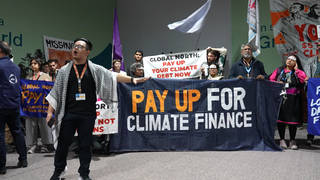
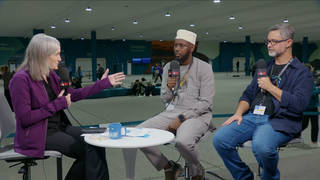
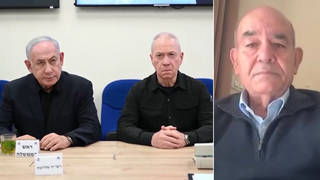
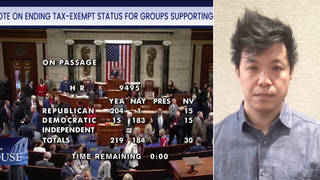






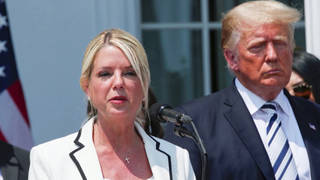
Media Options